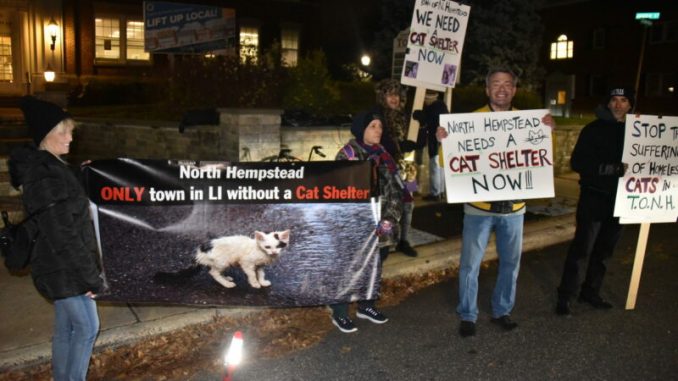
A crusade to improve conditions for feral cats
Stuart Kroll of Great Neck is an unabashed cat lover. He has appeared numerous times before the Town of North Hempstead Town Board over the past several years to urge trustees to do more for the growing feral cat population.
It’s been a problem for decades in the town, with animal advocates periodically pressuring elected officials to aid the feral cats. In the past the town has worked with animal welfare groups, tried different population control initiatives, and was even close to building an expansion at its shelter to house cats.
“The Town of North Hempstead is the only one on Long Island that does not have a shelter for cats,” Kroll charged during public comment earlier this year. “If someone sees [an unleashed, unaccompanied] dog in the street, they can call 311 and that is handled. It’s a matter of public safety. If you see a cat in the street and you call 311, they say, ‘Sorry, we can’t help you. Maybe you can get it yourself and bring it to our TNR (trap-neuter-release) clinic once a month.’ ”
(Note: Reportedly, the small Town of Shelter Island also does not have a cat shelter. Other towns either have a place for cats in their shelters or contract with non-profit animal welfare groups to handle cats.)

(Photo by Frank Rizzo)
North Hempstead’s animal shelter is part of the public safety department and is located in Port Washington. It only takes in and places dogs for adoption. Its operations will cost taxpayers about $869,000 in the 2023 adopted budget, an increase of $34,000 from the 2022 spending plan. There was no line in the budget on the cost of the TNR program, but Mark Albarano, deputy commissioner for public safety, mentioned a figure of $60,000 to $70,000 when he appeared before the board at an Oct. 6 budget workshop.
The town contracts with a part-time trapper to help residents deal with feral cats, but Kroll dismissed the efforts as “a drop in the bucket.”
He went on to note that he joined with other volunteers and a nonprofit, All About Cats in Freeport, “that expend an enormous amount of time and money to try to alleviate the suffering of these animals. This is truly a public health issue. Cats are being born and dying in the street.”
Kroll related that people regularly contact him to handle feral cats and he detailed some of his efforts, calling them, “one tiny little microcosm of what goes on in the town.”
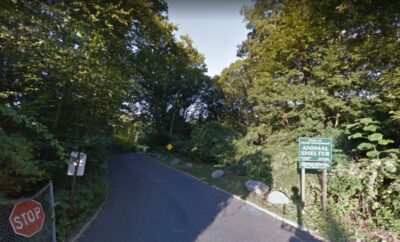
He noted that more than 20 years earlier, then-Supervisor Jon Kaiman made a promise to open a cat shelter and ground was broken in 2005, but nothing came of it. Construction was stopped and Bohemia-based contractor Kenstar Construction sued the town for non-payment in 2008. The case was settled in 2009, when the town paid the contractor about $130,000.
“I would like to see some action on the part of the town to alleviate the suffering of these animals that did not ask to be born in this way,” Kroll said. “I really wish that people would take this seriously. This is an ongoing problem. If you look at any other town on Long Island—Oyster Bay, Hempstead, Smithtown, Brookhaven—they’ve got an animal shelter that takes dogs and cats. We are the anomaly.”
He added, “The town’s own feasibility study showed that 33 cats could be housed at the dog shelter and that’s far better than we have now, which is absolutely nothing. This town has the worst conditions for cats of any town on Long Island, with no cat shelter and a pathetic TNR program. I personally have two spots coming up for the [TNR] clinic on Aug. 13. I normally get five. There’s nowhere for these female cats to go to recover after being spayed. Normally, it’s a two-day medically necessary recovery. To throw these cats right back out on the street is medically dangerous and cruel.”
Anton Media Group asked for a copy of the feasibility study—commissioned in 2019 to, per a press release, “make recommendations on the potential of creating a new cat shelter and program”—but as of this posting it had not received a reply to a Freedom of Information Act request. A published report on the study, for which the town paid consultants Nelson & Pope $34,500, concluded that it would cost $378,000 to expand the existing shelter to house 33 cats.
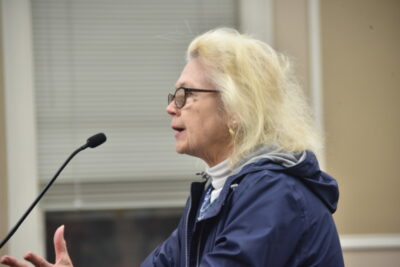
Again drawing an invidious comparison, Kroll noted that in the Town of Hempstead’s TNR program, town residents can potentially process dozens of cats by themselves, thanks to a weekly clinic.
“Five cats [in a month for me at the TNR clinic] here is just beyond pathetic,” he observed. “Nothing has been done regarding the situation and apparently nothing is going to be done. We live in a very wealthy town and there’s no reason for this heinous suffering of cats to occur. Cats are not wild animals like raccoons or skunks. They’re basically domestic animals. It’s unconscionable that private individuals that are empathetic to their plight are forced to do the heartbreaking work themselves and pay for everything out of their own pocket.”
In addition, the way the town’s TNR program operates makes it difficult for cat lovers, because the uncooperative felines need to be captured the night before the clinic. A portion of the animal shelter is used for the operation and then the person who dropped off the cats is called to pick them up and return them to the place where they were trapped.
“The town tried to negotiate with private shelters [to keep cats],” Kroll affirmed. “The only problem was they offered nothing—no resources, no money, no medicine, no food, absolutely nothing. So obviously, there’s no reason for them to partner with the town in any way.”
One of those who coordinated with the town in the past was Jack Hausman, co-president of the Great Neck-based Humane Urban Group, a cat welfare non-profit that traps and neuters and finds homes for a number of cats each year. He told Anton Media Group that he had a one-year contract in which he would bring trapped cats to the town to be spayed/neutered. However, the town then demanded that the non-profits show proof of liability insurance. They could not afford it, according to Hausman, so the cooperation ended.
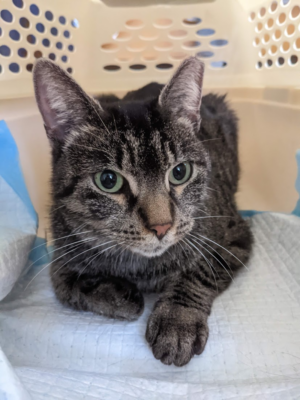
“It’s atrocious that they have done nothing at all,” Hausman said of the town’s feral cats efforts. “Yes, there’s a need for a shelter, but for me, there is a much better need for [reducing feral] cats by spaying and neutering.”
Kroll promised to continue to advocate for animals before the board, warning trustees that he will work to make it an election issue.
At the Sept. 1 meeting, the advocate returned again to the cost borne by private citizens, especially when they took homeless sick cats to costly emergency veterinarian services.
“This is a matter of basic morality and decency. This problem should be dealt with expeditiously and fully—half hearted measures are simply not acceptable. We are now taking all possible steps and I mean all possible steps so that as many as citizens that we can reach become informed that our town allows its suffering to occur,” Kroll said, before reminding Supervisor Jennifer DeSena that they had spoken at length about the issue during her campaign, and she signed a petition along with 2,000 other citizens asking that a cat shelter be built.
“Until now you have done absolutely nothing to help the situation,” he told the supervisor. “Your office doesn’t return phone calls. Vacuous campaign promises don’t do it for me.”
Wendy Bonczek of Roslyn Heights also spoke at the September meeting and said she trapped cats once a month, just before the TNR clinic. She pleaded for North Hempstead to increase the frequency of the TNR program, adding praise for Lisa Cioffi, the town’s animal shelter director.
“The sad thing is, you see all the baby kittens and young kittens, they’re lying in the street, they’ve been run over. And this could be avoided if we could get all these cats neutered,” she said.
Bonczek added that once the cat population has been brought under control, the TNR clinic can go back to once a month.
Protesting For Cats
Kroll, along with several other cat lovers, held protests in front of town hall before the Nov. 17 and Dec. 15 town board meetings. In addition, the group held up signs and placards across the street on Dec. 2 as the town hosted the Manhasset Christmas tree lighting at Mary Jane Davies Park. It was also present at the Menorah lighting ceremony later in the month.
Nina Gordon of Great Neck was part of the protest and has been active in cat rescue efforts for many years.
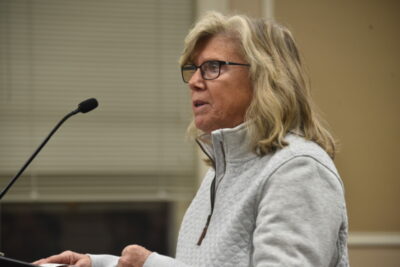
“Currently, [the town has] a contract with someone who lives in Massapequa to do the trapping, and here are all the people in this town who could be doing it,” Gordon said. “They’re paying a lot of money and it’s not a cost-effective or efficient way to deal with the problem.”
She added, apropos the bitter November night, “It’s very cold. I don’t mind being out here because at least I have a warm place to go to, unlike the cats on the street. I have three cats at home and I just can’t bring a cat off the street into my house even though I care and I love cats. I’ve got no place to bring them. I got a friend who lives in Manhasset—she’s not here tonight, she usually is at these protests—she’s got an entire basement set up to accommodate cats. There are people who are dedicated to this because the town is doing nothing.”
Kroll, holding up a sign nearby, charged, “They just don’t care.”
Gordon responded, “It’s not that they don’t care. I think it’s low on their priority.”
“It’s just not important to them,” Kroll added.
The two discussed the town’s hiring of an animal warden.

In an email responding to an inquiry, a town spokesperson told Anton Media Group, “The animal warden is indeed a budgeted position for 2023. It will be a full-time civil service union position, who will assist with taking lost dogs back to the animal shelter, bringing dogs to the veterinarian and assist residents with finding their dogs. Additionally, the feral cat coordinator is a completely separate position that is currently filled with responsibilities that do not and will not overlap with the animal warden position. “
The feral cat coordinator was hired in 2019, according to a town press release.
This new animal warden position did not much impress Gordon and Kroll, with the latter stating, “There’s only two things that matter—the cat shelter and enhanced TNR.”
Gordon believed there are solutions short of a shelter, arguing the town can enter into agreements with local animal hospitals and provide town residents with a voucher program allowing them to brings cats to a hospital to be spayed/neutered. Then the cats could recover overnight at the hospital and subsequently be picked up and released.
“You have to make it work,” she said, “because soon we’ll be finding frozen kittens. It’s really sad.”
Later that evening, during public comment at the board meeting, Liz Diamond of Roslyn Heights said that when she moved to the area from New York City eight years earlier, someone told her about a colony of cats who no longer had a feeder and they needed someone to take over the responsibility, so she offered to do so. She went on to say that she’s currently feeding 12 cats and has had 45 cats fixed and 30 adopted over the time frame.
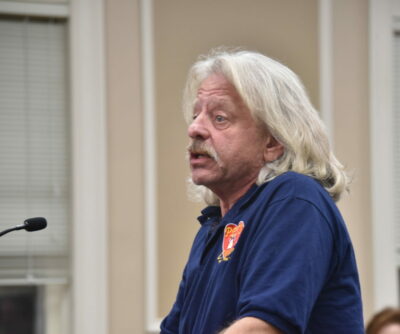
She warned, “Cats reproduce every three months and if they’re not fixed, they can have four litters in one year and it’s a nightmare. I personally have spent a lot of money caring for these animals and I do it because I love them and there’s nobody else really to help. But a lot of people that I’ve met are living on a shoestring budget. They don’t have the money to spend for this and it’s just very difficult. Since the pandemic started a lot of people have been dumping their dogs and cats who were used to living inside. It’s a real problem. I just hope that you guys have a heart and you will help us somehow, somewhere, some way to find the shelter for these animals.”
Kroll followed her, and alluded to the millions of American Rescue Plan Act funds the town board was supposed to spend. He hoped trustees would find money to help feral cats.
A few days earlier, Governor Kathy Hochul announced that nearly $5 million had been awarded to 17 animal shelters and animal welfare societies via the New York State Companion Animal Capital Fund. The deadline for request for proposals for the 2022 funds ended in January.
Kroll criticized the town for not taking advantage of those monies. The Town of Hempstead, he pointedly said, got $52,000 from this fund and mentioned figures for other recipients on Long Island.
“I assume you guys are aware that you could have applied for these grants,” Kroll concluded. “It’s long past time that the suffering of these cats should be ignored.”
DeSena mentioned that the North Shore Animal League, based in Port Washington, had recently implemented a Community Outreach Program to, per its website, “bring awareness to the plight of community cats through education, TNR (Trap, Neuter, Return), assisting with the adoption of friendly cats and kittens, and supporting community cat caretakers. The program is designed to provide education to the public on how to help these cats live long and healthy lives, while at the same time reducing the population through TNR and adoption of ‘friendlies.’”
Kroll continued his prior criticism of the Animal League, which bills itself as the largest no-kill animal rescue and adoption organization in the world. He claimed that it does nothing to help most cats, while Diamond said the organization prefered kittens that it can adopt.
The supervisor pointed out that the program is still new, implying that the critics ought to give it a chance. She had visited the Animal League to celebrate the opening of the program’s headquarters within the existing facility.
Also speaking at the Nov. 17 meeting was David Bernacchi of the Pets4Luv Foundation, based in Hicksville. He noted that his non-profit just reached an agreement with Nassau County to rescue feral cats from county-owned sump properties.
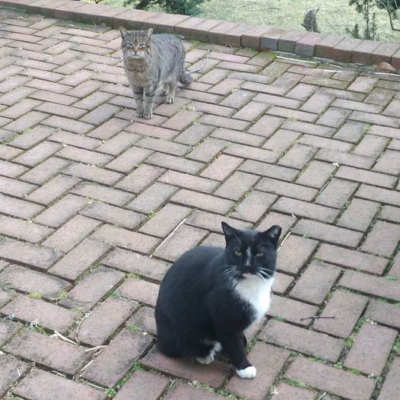
“I’ve been doing rescues for over 30 years,” he said. “The feral cat problem is a major [one], especially in North Hempstead. Let’s face it, it’s not birds flying and dropping cats. It’s the people that are releasing them, and not having them fixed. That is causing the problem. It’s a predicament for the cats. It’s not what they choose. So I’m here to start learning and help in any way I can. [The cats are] suffering. They’re out there dying, getting hit by cars. There’s so many. Something’s got to be done to make progress. It’s not going to happen overnight. And I’m actually here hoping that maybe we can get together and discuss different options. What your limits are, what you might be able to do and what we might be able to do to help you [to solve] this problem.”
In an email exchange with Councilwoman Veronica Lurvey that she shared with Anton Media Group, Gordon wrote, “… the cats are still multiplying and dying in the streets in North Hempstead, and volunteers like me and my rescue friends are doing the town’s work. It’s tantamount to animal cruelty on the part of our local government, and it’s an embarrassment and a shame that it is allowed to happen in this wealthy and well-educated town. Please feel free to share this with your fellow trustees and Supervisor DeSena. I will continue to come to meetings and speak out about this issue. The problem is not going away, and it needs to be addressed.”
In addition, Gordon did research into the town’s 2009 agendas and found a number of resolutions dealing with bids for expanding the animal shelter. One authorized an amendment to an agreement with Herricks Mechanical Group for construction of a building addition at the shelter. Similar amendments to agreements with electrical and plumbing/HVAC contractors also passed.
Despite inquiries, neither Gordon nor Anton Media Group could learn any more about this effort to expand the shelter to possibly take in cats.
Asked earlier this year by Anton Media Group about a possible cat shelter, DeSena replied, “It’s a big ticket item. We’re going through the budget process right now and there are a lot of things that people want. There might be other, more cost-effective ways to deal with cats.”

